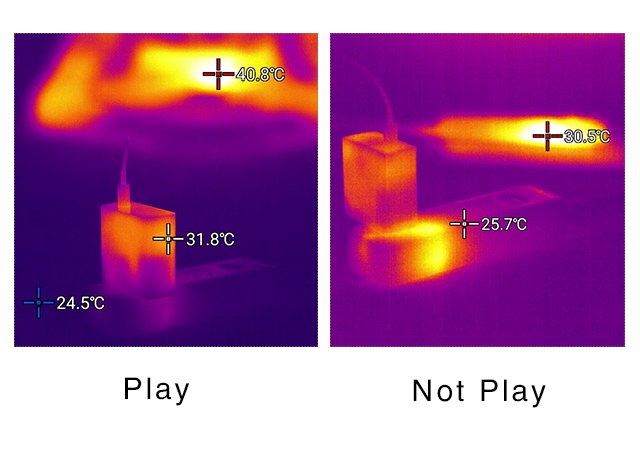Can the cellphone be played while charging? How high is the temperature when charging a mobile phone while playing? Infrared technology will reveal the secret and give you an answer.
Cellphones can generally be used while they are charging. However, it is important to note that using a phone while charging may generate some heat. The exact temperature increase during charging and usage can vary depending on factors such as phone model, battery capacity, and charging method.
Typically, when a phone is charging and being used simultaneously, the temperature tends to rise slightly higher than when it is only being charged without any usage. This is because both charging the battery and using the phone’s resources can generate heat. Let us use the infrared camera to see the heat comparison between the use and non-use of mobile phone when the mobile phone is charging.

This problem leads to an application of infrared technology, which is to detect damage caused by excessive temperature of electronic components. Infrared technology can indeed be useful for measuring the temperature of a charging phone. It can reveal the amount of heat being generated and provide insight into any potential overheating issues. Manufacturers often conduct thermal tests using infrared thermography during the development and testing of smartphones to ensure they remain within safe temperature limits.
Infrared technology is often used to detect overheating in mobile phones by measuring the temperature of specific components or areas of the device. Here’s a general overview of how this technology works:
1.Infrared Thermography
Infrared thermography involves using an infrared camera or sensor to detect and measure the heat emitted by objects. These cameras can detect infrared radiation, which is invisible to the human eye but can be translated into temperature readings.
2.Thermal Image
When using infrared technology to detect overheating in mobile phones, a thermal imaging camera or sensor captures the surface temperature distribution of the device. This produces a thermal image or “heat map” that represents the varying temperatures across different areas of the phone.
3.Hotspot Identification
By analyzing the thermal image, hotspots or areas of high temperature can be identified. In the context of mobile phones, these hotspots may indicate components or areas that are generating excessive heat during usage or charging.
4.Temperature Analysis
The thermal image can be further analyzed to measure the specific temperatures of different components or areas. This helps in identifying potential issues or abnormalities compared to expected temperature ranges.
The measured temperatures can be compared with the recommended safety limits provided by the phone manufacturer. If any component or area exceeds these limits, it may indicate a potential overheating problem or malfunction.
By using infrared technology, manufacturers can assess the thermal behavior of mobile phones during development, testing, and quality control processes. It helps ensure that the devices operate within safe temperature ranges and can detect any potential overheating issues that might affect performance, durability, or safety.
It’s important to note that while infrared technology is effective in detecting temperature variations, it doesn’t provide a comprehensive analysis of the underlying causes of overheating. Therefore, it’s always recommended to consult the manufacturer’s guidelines and advice for specific information and solutions related to your mobile phone.
Go Top